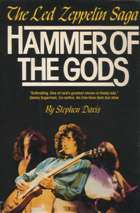Hammer of the Gods (book)
 | |
| Author | Stephen Davis |
|---|---|
| Language | English |
| Subject | Biography |
| Genre | Non-fiction |
| Publisher | William Morrow & Co |
Publication date | 1985 |
| Media type | |
| ISBN | 0-688-04507-3 |
| OCLC | 11371190 |
| 784.5/4/00922 B 19 | |
| LC Class | ML421.L4 D4 1985 |
Hammer of the Gods is a book written by music journalist Stephen Davis, published in 1985. It is an unauthorized biography of the English rock band Led Zeppelin. After its release it became a New York Times bestseller paperback, and is hyped by its publisher as being the best-known Led Zeppelin biography.[1] It has been reprinted three times since its first publication and has been released under the alternative title Hammer of the Gods: The Led Zeppelin Saga. The title is derived from a line in "Immigrant Song", a track from the band's third album.
Davis travelled with Led Zeppelin for two weeks at the beginning of the band's 1975 U.S. Tour, while he was a music journalist at Rolling Stone magazine.[2]
Criticism
The book has been the subject of much criticism. Chicago Tribune music reviewer Greg Kot, called it "one of the most notorious rock biographies ever written".[3] All three surviving members of the band have cast doubts on its accuracy,[4] with one article summarising their collective view of the book as a "catalogue of error and distortion."[5]
Guitarist Jimmy Page has stated:
I think I opened [the book] up in the middle somewhere and started to read it, and I just threw it out the window. I was living by a river then, so it actually found its way to the bottom of the sea.[6]
According to the band's vocalist Robert Plant:
The guy who wrote that book knew nothing about the band. I think he'd hung around us once. He got all his information from a guy who had a heroin problem who happened to be associated with us. The only thing I read was the "After Zeppelin" part, because I was eager to get on with the music and stop living in a dream state.[7]
The band's bassist, John Paul Jones stated:
It's a very sad little book. It made us out to be sad little people. He ruined a lot of good, funny stories.[8]
One of the author's primary sources of information was Richard Cole, the band's tour manager. As Plant explained:
He [Davis] did a lot of investigations with a guy who used to work with Led Zeppelin, Richard Cole, who, over the years, had shown deep frustration at not being in a position to have any authority at all. He was tour manager and he had a problem which could have been easily solved if he'd been given something intelligent to do rather than check the hotels, and I think it embittered him greatly. He became progressively unreliable and, sadly, became a millstone around the neck of the group.These stories would filter out from girls who'd supposedly been in my room when in fact they'd been in his. That sort of atmosphere was being created, and we were quite tired of it. So eventually we relieved him of his position and in the meantime he got paid a lot of money for talking crap. A lot of the time he wasn't completely well. And so his view of things was permanently distorted one way or another.[9]
Former manager Peter Grant in an interview with Proximity magazine called the book "completely unreliable" and that Davis had asked for money from him over the manuscript, before publication. Grant refused.[10]
The negativity of the book, along with other controversial music biographies by Davis, earned him the industry nickname "Stephen Salacious".[11]
Cole subsequently published his own autobiography that included his tenure as tour manager with Led Zeppelin, entitled Stairway to Heaven: Led Zeppelin Uncensored (1992), which was also criticized by members of the band.
References
- ↑ "Ramble On", Q Led Zeppelin Special Edition, 2003, p. 145.
- ↑ Caleb Daniloff, "Rock from Axl to Zep", BU Today, October 21, 2008.
- ↑ Greg Kot, "Mystery Man", Chicago Tribune, October 15, 1999.
- ↑ Joel McIver, "Zep-O-Philia", Classic Rock Magazine : Classic Rock Presents Led Zeppelin, 2008, p. 126,
- ↑ Mat Snow, "Apocalypse Then", Q magazine, December 1990, p, 79.
- ↑ Led-Zeppelin.org. "Led Zeppelin Assorted Info".
- ↑ Chuck Klosterman, Interview with Robert Plant, originally published in Spin Magazine, reproduced at manicnirvana.com.
- ↑ Stryder. "John Paul Jones AOL Chat 11/17/97".
- ↑ Snow, Mat (June 8, 1985). "Percy Pulls It Off". New Musical Express. Retrieved 2008-01-23.
- ↑ Jones, Hugh (April 1993). "Interview with Peter Grant". Proximity. 4 (9): 4.
- ↑ Simon Sweetman, "Rock Stars in need of money/therapy", Stuff.co.nz, January 20, 2011.